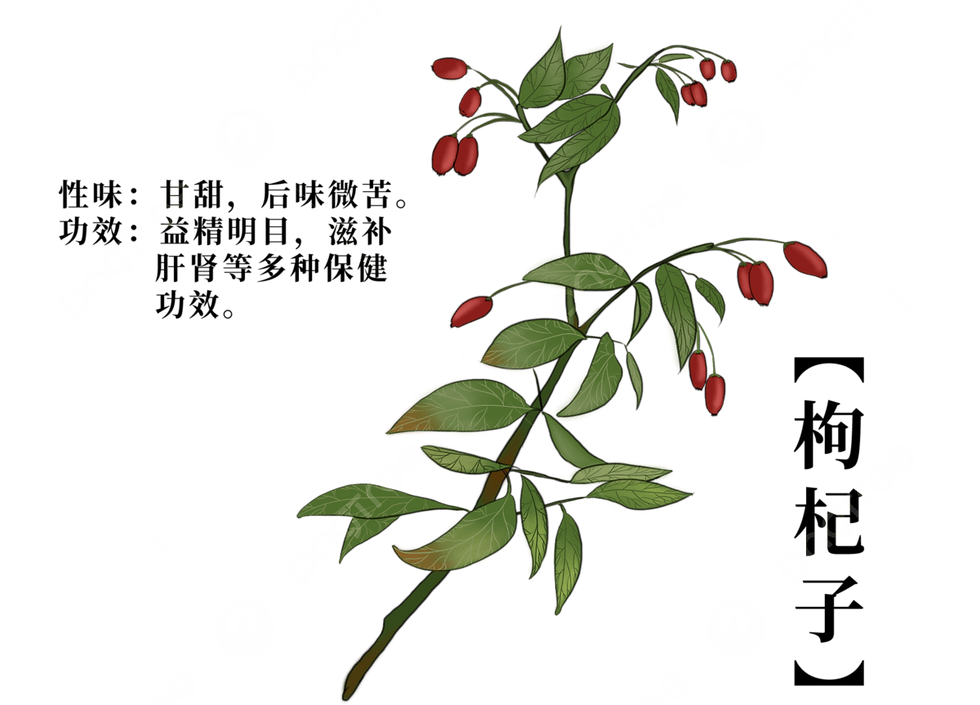Goji Berry: The TCM Herb for Liver, Kidney, and Vision Health
- Hongji Medical

- Jun 22, 2025
- 4 min read
Goji Berry, also known as Wolfberry Fruit or Lycium barbarum, is the dried, mature fruit of a plant in the nightshade family. Celebrated in Traditional Chinese Medicine (TCM) for its gentle nourishment of the liver and kidneys, as well as its ability to improve vision and boost vitality, it is both a medicinal herb and a popular food.
Goji Berry’s use dates back to ancient times. The Shennong Bencao Jing (Shennong’s Classic of Materia Medica) listed it as a top-grade herb, noting its ability to clear internal heat, quench thirst, and strengthen muscles and bones.
The Mingyi Bielu further described its role in relieving fatigue and boosting energy. In the Compendium of Materia Medica, Li Shizhen detailed its growth across China, emphasizing its benefits for kidney nourishment, lung health, and vision. Goji Berry is a cherished remedy for liver and kidney deficiencies.

Properties of Goji Berry
Nature and Channels
Taste: Sweet
Nature: Neutral
Channels: Liver, Kidney
Main Benefits
Nourishes liver and kidneys
Boosts essence and improves vision
Fights aging with antioxidants
Enhances immunity
Supports healthy blood sugar and lipid levels
Dosage
Internal use: 6–12 grams, boiled in decoctions or eaten directly.
Growing Regions
Primarily grown in Northwest China, with Ningxia producing the most renowned variety, harvested in summer or autumn.
Identification
Shape: Spindle-shaped or elliptical, 6–18 mm long, 3–8 mm in diameter.
Color: Bright or dark red with irregular wrinkles, a small style mark at the top, and a stalk mark at the base.
Texture: Soft and moist, sweet when chewed.
Preparation
Used raw or wine-fried. Wine-frying enhances its liver and kidney nourishment.

Clinical Uses of Goji Berry
Goji Berry is used in TCM to treat various conditions:
Liver and Kidney Yin Deficiency: Relieves lower back pain, weak knees, dizziness, tinnitus, dry mouth, night sweats, or heat sensations in the hands and feet.
Essence and Blood Deficiency: Addresses premature graying, loose teeth, memory loss, insomnia, numbness, anemia, or irregular menstruation.
Vision Decline: Eases blurry vision, dry eyes, night blindness, or tearing in the wind due to liver and kidney weakness.
Lower Back and Knee Weakness: Improves aching and weakness from poor nourishment of muscles and bones.
Diabetes: Helps regulate blood sugar levels.
High Cholesterol: Supports healthy blood lipid levels.
Low Immunity: Strengthens the body’s defenses against illness.

Specific Benefits
Nourishing Liver and Kidneys: Contains polysaccharides and alkaloids that replenish yin and essence, easing weakness and dizziness.
Boosting Essence and Vision: Nourishes blood to improve eyesight and reduce eye strain.
Antioxidant and Anti-Aging: Polysaccharides neutralize free radicals, slowing aging.
Enhancing Immunity: Strengthens immune function to prevent colds.
Regulating Blood Sugar and Lipids: Supports metabolic health.
Goji Berry in TCM Formulas
Goji Berry is often combined with other herbs in TCM formulas to enhance its effects. Here are some examples:
Qi Ju Di Huang Wan (Goji, Chrysanthemum, and Rehmannia Pill): Combines Goji Berry with Chrysanthemum, Rehmannia, Cornus, Yam, Poria, Moutan, and Alisma to nourish liver and kidneys, treating blurry vision and dizziness.
Zuo Gui Wan (Left-Restoring Pill): Includes Goji Berry with Rehmannia, Yam, Cornus, Achyranthes, Cuscuta, Deer Antler Glue, and Turtle Shell Glue to nourish yin and essence, addressing lower back pain and night sweats.
Wu Zi Yan Zong Wan (Five Seed Pill for Reproduction): Uses Goji Berry to nourish kidneys and boost essence.
Comparison with Similar Herbs
Goji Berry shares liver and kidney-nourishing properties with other TCM herbs but has distinct traits:
Shu Di Huang (Rehmannia): Strongly nourishes yin and blood, ideal for severe essence and blood deficiency.
Shan Zhu Yu (Cornus): Nourishes liver and kidneys with astringent properties, best for leakage conditions like night sweats.
Tu Si Zi (Cuscuta): Nourishes kidneys and liver, supports fertility, and prevents miscarriage.
Goji Berry’s neutral, gentle nature and vision-enhancing focus make it ideal for daily use, unlike the stronger Shu Di Huang or astringent Shan Zhu Yu.
Modern Applications and Research
Modern research highlights Goji Berry’s benefits:
Immune Support: Polysaccharides boost immunity, preventing infections.
Antioxidant Effects: Neutralizes free radicals, delaying aging.
Blood Sugar Regulation: May lower blood sugar, aiding diabetes management.
Liver Protection: Protects against chemical liver damage.
Vision Improvement: Supports eye health and reduces strain.
Goji Berry is widely used in health foods, eye care products, diabetes management, and liver support supplements, often consumed as a snack or tea.
Precautions for Using Goji Berry
Excess Heat Conditions: Avoid during colds or fevers with strong heat, as its nourishing nature may trap pathogens.
Spleen Deficiency with Dampness: Use cautiously in cases of bloating or loose stools, as it may worsen dampness.
Diabetes Patients: Consume in moderation due to its sugar content, under medical guidance.
Conclusion
Goji Berry is a versatile TCM herb known for nourishing the liver and kidneys, improving vision, and boosting vitality. Its gentle nature makes it ideal for treating weakness, vision issues, and low immunity, while its food-medicine duality allows daily use in teas or snacks. Modern research confirms its antioxidant, immune-boosting, and metabolic benefits. To use safely, avoid during excess heat or damp conditions and consult a TCM practitioner for proper dosage. Goji Berry remains a beloved remedy for health and longevity.




